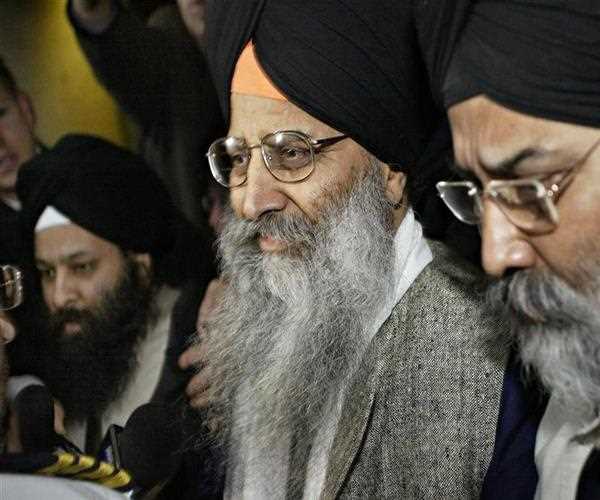
15-Jul-2022
1985 Air India bombing accused Ripudaman Singh Malik shot dead in Canada
Ripudaman Singh Malik, the founder of Khalsa Credit Union, and acquitted in the 1985 Air India bombing case, was fatally murdered on Thursday morning in Surrey, British Columbia, according to Canadian news sources. Malik oversaw two campuses of the exclusive schools in Surrey and Vancouver while serving as head of the Khalsa School in recent years.
According to witness testimonies provided by CBC News, Malik was shot three times in the neck.
According to media sources, the local police confirmed that shots were fired at around 9.30 a.m. local time, and that a man died from his wounds there. It appeared to be a targeted shooting, they claimed.
On June 23, 1985, all 329 people on board Air India Flight 182, Emperor Kanishka, a Boeing 747 travelling from Montreal to Delhi, were killed in a blast that included Malik, Inderjeet Singh Reyat, and Ajaib Singh Bagri.
Reyat, who was called as a prosecution witness, claimed he could not recall the specifics of the scheme or the names of individuals involved. As a result, Malik and Bagri were found not guilty of the 329 first-degree murder counts against them.
Mr. Malik denied taking part in the terrorist assault that claimed 329 lives. In 2005, he was found not guilty, but police were charged with conducting a flawed investigation.
The bombings, which are still considered Canada's greatest terror incident, are widely thought to have been committed by Sikhs living in Canada in retaliation for India's fatal 1984 invasion of the Golden Temple, the most sacred site in the Sikh religion.
Ajaib Singh Bagri, a Sikh businessman, and Mr. Malik were cleared of charges of mass murder and conspiracy in connection with the two explosions after a two-year trial.
According to Canadian authorities, they are currently investigating the reason for Mr. Malik's targeted killing.
On June 23, 1985, Air India flight 182 from Canada to India crashed off the coast of Ireland, killing all 329 aboard, the majority of whom were Canadian nationals visiting family in India.
A second bomb in Japan prematurely detonated about the same time, killing two luggage workers.
The bombs on the plane were allegedly planted there by Mr. Bagri and Mr. Malik.
However, the prosecution's case rested on whether or not crucial prosecution witnesses who asserted the accused had admitted to involvement in the bombing in private were reliable.
According to a witness quoted in the investigation, Malik was dragged from his scarlet Tesla bleeding from a neck wound after hearing three bullets. Malik, the gunshot victim, was recognised by a second witness from a nearby company.
The report also stated that the cops claimed to have found a suspect vehicle that was on fire.
According to a different CBC News article, the victim's identity was eventually made public by police after Malik's son, Jaspreet Malik, posted a statement about his father's shooting on social media.
Reyat had previously been found guilty and given a 10-year sentence for two charges of manslaughter connected to a different explosion at Tokyo's Narita airport that claimed the lives of two Japanese citizens. For one count of manslaughter in the Kanishka explosion, he received a five-year sentence. The bomb aboard the Air India flight, which was checked into cargo in a suitcase during a layover in Vancouver, reportedly exploded over the Atlantic Ocean in Irish airspace at a height of 31,000 feet, according to investigators at the time.
Another bomb went off at the Narita airport that day, killing two luggage handlers.
A luggage that had been checked onto a Canadian Pacific Airlines flight in Vancouver and was later to be boarded by Air India Flight 301 to Bangkok contained the device.
Inderjit Singh Reyat, who assisted in the bomb production and lied in court proceedings, including Malik's, was found guilty of multiple offences and sentenced to 30 years in prison. After serving two-thirds of his perjury term, he was granted freedom in 2016.
Reyat was the only individual found guilty for the Kanishka explosion, which Khalistani extremists said was their act of retaliation for the Indian army's removal of militants from the Golden Temple in 1984.
Following Operation Blue Star in 1984, Canadian and Indian authorities came to the conclusion that the two attacks were connected and had been planned and carried out by Sikh separatists operating in Canada.
Malik had written a letter to Prime Minister Narendra Modi at the beginning of the year, just before the Punjab elections in February, thanking him for the actions taken for the welfare of the Sikhs. He had cautioned against a planned effort to discredit the Prime Minister by listing the several measures by the BJP, including the reopening of the 1984 riots cases.
In May, after receiving numerous visas, Ripudaman travelled for a pilgrimage to Andhra Pradesh, Delhi, Punjab, and Maharashtra, according to Indian World Forum president Puneet Singh Chandhok.
Paramjit Singh Sarna, head of the Shiromani Akali Dal in Delhi and a former leader of the Delhi Sikh Gurdwara Management Committee (DSGMC), issued the following statement: 'I am very pained by the passing of Sardar Ripudaman Singh Malik in Canada. The harm is beyond repair. In addition to overseeing several Khalsa schools, Sardar Malik was a leader in Canada's humanitarian initiatives. My deepest sympathies go out to his family. We anticipate that the Canadian government will start a comprehensive investigation into his death and prosecute those responsible.

Student
current post-graduate student at christ university and an aspiring content writer with experience in working on online content creation and research..
Join Our Newsletter
Subscribe to our newsletter to receive emails about new views posts, releases and updates.
Copyright 2010 - 2026 MindStick Software Pvt. Ltd. All Rights Reserved Privacy Policy | Terms & Conditions | Cookie Policy